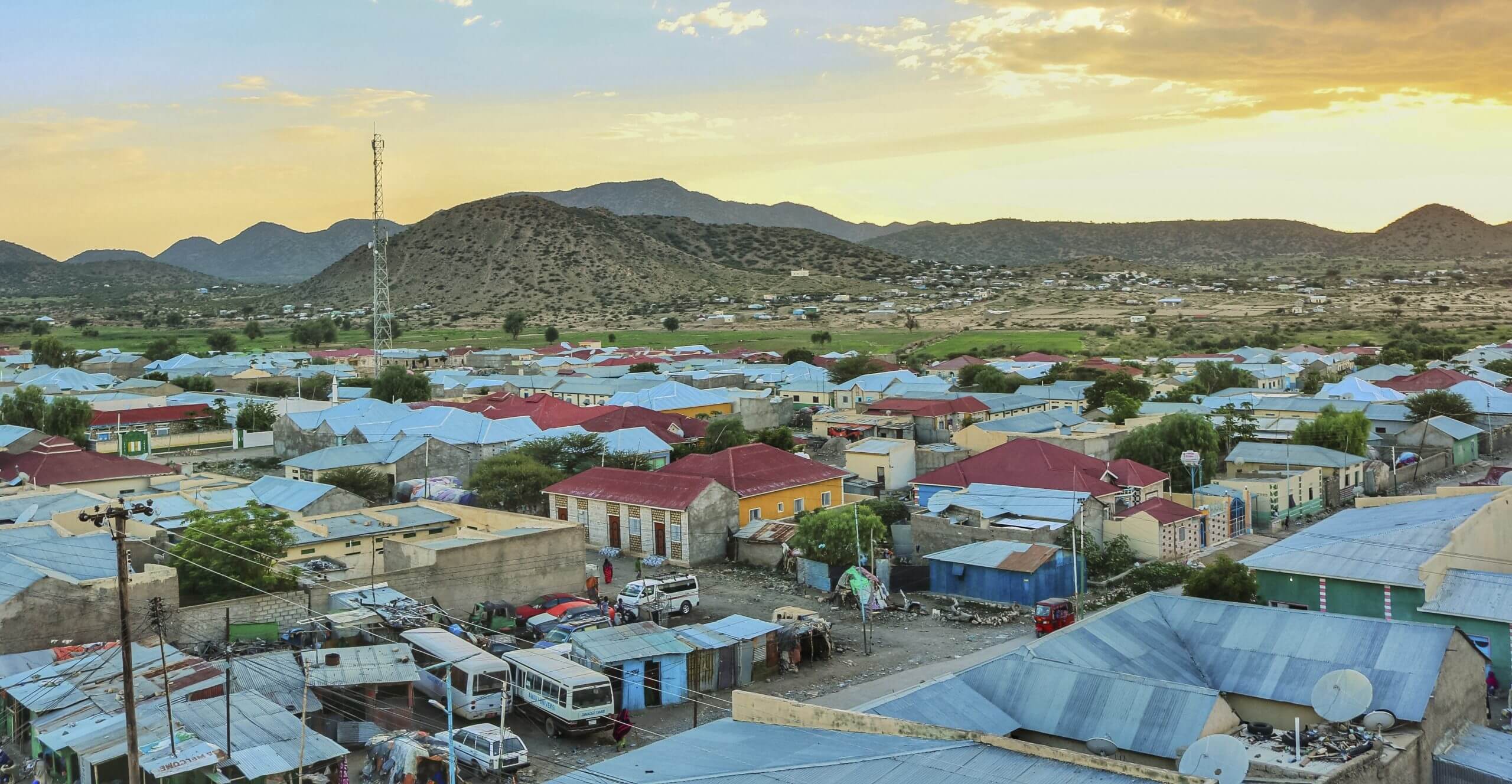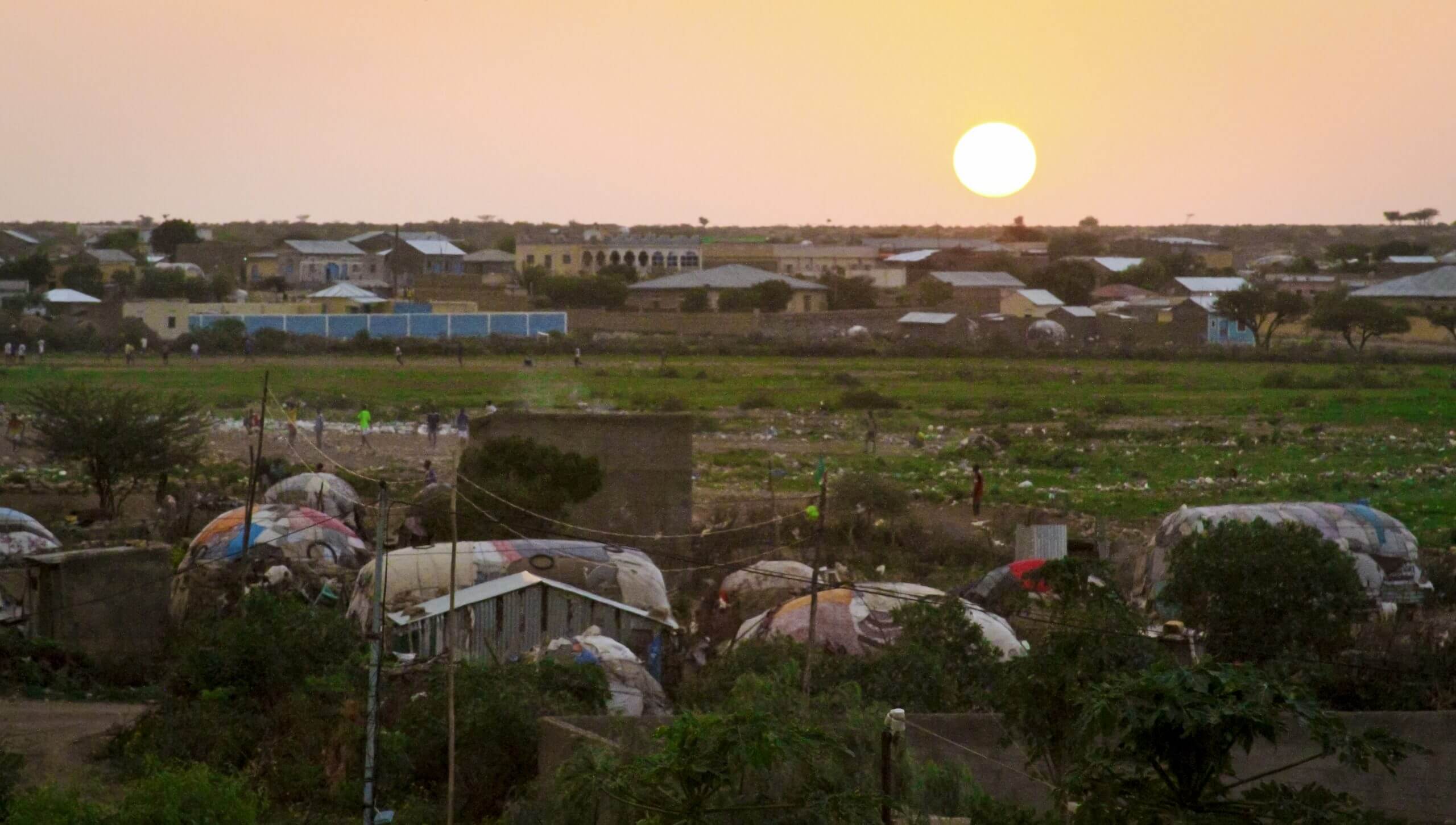The dirt from Borama, wrenched from the earth and hurled down in swirling cyclones before a thunderstorm, seeped into me. It would stay for weeks beneath my fingernails, no matter how hard I scrubbed.
I said Borama was beautiful and my husband laughed every time. Was it the bumpy dirt road? The herds of goats? The expanse of empty earth, pock-marked with thorn bushes and camel trains? Was it the layer of dust that settled like a mosquito net over every surface and shimmered in the late afternoon Somalia sun? Maybe it was the distance from modernity, the isolation.
I insisted. Borama was beautiful, in a desperate way. The expanse that spoke of emptiness also spoke of wild adventure and discovery, freedom. The hollow drumbeat of a wooden stick on a yellow plastic jug so my neighbors could dance, the rancid flavor of laxoox, sorghum flatbread, offset by sugary tea.
Twelve years away from Borama, Somaliland and I still feel a sweet, wistful affection, a connection that dredges up fondness for the village that ejected me. We will never be more than 10 months when I was 24. We will never be more than my first footsteps in Africa on a journey that is ongoing. That is why I still love Borama. That is why, when I write, I still imagine myself sitting at a rough, hand-crafted desk in front of a wall painted half white and half aqua, listening to the mosque on the corner, the chickens in the yard, the donkey next door.
Borama. I barely remember it. But it was the first foreign soil into which I dug roots, fast and hard, and now it is the never-never land of nostalgia. Every other city I live in — Minneapolis, Djibouti, Nairobi — is weighed against Borama, hardly a city itself. A rural village in northwestern Somalia that ebbs and swells with nomads and seasons. A place where we were warmly welcomed.
We will never be more than 10 months when I was 24.
I thought that Borama wanted us. It turned out most of the people did, but some wanted to swallow us whole, eradicate us, forget us. Remembering Borama is bittersweet, like scratching a mosquito bite. It feels so good but scratch too hard and you’ll draw blood.
~~
I learned, with urine on my ankles, in my first weeks in Somaliland, that using squatty potties like everything else I had taken for granted before coming here, was going to take a bit of practice. I stuttered and stammered my way through incomplete Somali sentences primarily composed of infinitives and inaccurate, singular nouns. Me to pee shoe.
I was helpless and flooded with confusion. I was off-kilter, not quite myself, like a shadow, signified in this inability to hygienically urinate. This left me feeling a loss of control, as did the AK-47s and Kalashnikovs slung over almost every man’s shoulder. But it was a redeeming loss, a loss that revealed dormant courage and driving curiosity, a loss that showed how much there is to gain by relying on others. It was a loss of self that was hopeful that a new, stronger, and more open self would emerge.

The streets of Borama, Somaliland were once home to author Rachel Pieh Jones, her husband, and her twin children. PHOTO: HANA OMAR.
The outer scaffolding of American culture, consumerism, customs, and roles, was torn down. Everything from my clothing to my language needed to adapt and I naively assumed these external transformations were sufficient, that they connected me with the community. In some ways, this was true. I learned to dance with my neighbors and to dip laxoox into my tea without spilling. But as I adopted the role of learner, as neighbors cheered when I nailed a new vocabulary word, as friends showed me how to keep my headscarf from slipping, I changed in more internal, fundamental ways. How I viewed the world changed, the way I aimed to capture it with words changed.
I could write the stories people expected: of poverty and hopelessly tangled electrical wires and dysfunction and violence. But those were stories written from a distance by people seeking the next big headline, who came and stayed for a few days in a heavily-guarded hotel. I wanted to write about mothers preparing hard-boiled eggs for school snacks, children working puzzles on bare cement floors with their fathers, clandestine teenage romances, grandmothers herding goats. The average, the everyday. But I couldn’t write until I understood, so I waited, listened, observed.
~~
My husband taught Physics and English at Amoud University, which in 2003, in the rebuilding years after civil war, was the only functioning university in Somaliland. His days were filled with lesson plans, model rockets, meeting students, and navigating the cultural vagaries of a British educational system in rural Somaliland. When I wasn’t in the market trying to distinguish between beef and camel meat, and when the twins — Henry and Maggie — weren’t napping, I visited our neighbors, hoping to pick up the language, make a friend, learn.
Habsan taught me how to smoke hookah. She lived in an aqal — a rounded traditional nomadic home made from pliable sticks and colorful cloth — up a short hill from my cinderblock home. We sat outside on four-legged stools, with seats made from goat hide, and watched my kids and her grandkids scramble over boulders in plastic flip-flops. She tugged on her grandson’s penis to stop him from crying, and my son chased baby goats around prickly cacti. Once, while talking with another neighbor, I turned around and couldn’t see three-year-old Henry. I found him inside the aqal with Habsan, pipe in his mouth, eyes wide with forbidden glory. I swiped the pipe from his hands. Habsan laughed and Henry, chastened and proud, ran outside to chase more goats.

Borama, Somaliland a decade after author Rachel Pieh Jones fled. Traditional aqals are separated by an open field from the buildings of the city. PHOTO: UNHCR.
Habsan ushered me into the world of women and pregnancy, cooking over charcoal fires, and discussions of marriage and Somali fashion. She taught me traditional songs, and how to nonchalantly farmer-blow into the dirt because there was no need to waste money on tissues.
Amaal lived in a large, sturdy white house and had an influential husband working in the capital city, Hargeisa. We sat in her garden of peach and fuschia bougainvillea in the courtyard, as her daughter played with the twins. They were all the same age. One day, Amaal took me to Seven Star for lunch, where we were the only two women in the restaurant and sat behind curtains.
A Somali proverb said “A woman should either be in the kitchen or in her grave” and in theory, this idea limited women’s social lives to the home. Men and women didn’t publicly mingle or even touch hands to exchange money or a handshake, and respectable women stayed indoors except for when they had to get work done. Many of my Somali friends, like Amaal, were more practical than dogmatic and while they respected gender roles and the modesty of Islam, they also knew women needed community and spaces to relax.
The curtains at Seven Bar were intended for me and Amaal to eat without being ogled or harassed, while the men nearby could pretend we weren’t there.
Walls around homes and curtains at restaurants created privacy as much as protection. Though women were told not to whistle or speak too loudly, for fear of drawing attention, behind barriers, they feasted, and pounded on wooden drums, and sang.
~~
Borama was beautiful, like a white bougainvillea petal in the muzzle of an automatic weapon. Surprising, tender, precarious. Gray hills bordered the western edge of the village toward Djibouti. Dust billowed and swooped down over those hills on the front line of rainstorms.
When the dust began rolling toward our house, neighbors would shout at me to run inside and slam all the windows, quickly. A sandblasted face, stinging eyes, and fat, blooping raindrops that turned my dust-covered clothes to mud, taught me to be quicker next time.
Listen and obey, I learned. Somalis knew what they were talking about. When my friend told me I needed to be careful, that people wanted Westerners out, I believed her. I didn’t know what to do, we were already being careful. But, I believed her.
And then, Annalena Tonelli was shot in the head. An Italian working in Somali regions for more than 30 years, she had recently won the UN Nansen Refugee award. She ran an AIDS and tuberculosis hospital in Borama. She was shot at night, on the hospital grounds. Nearly two weeks later, Richard and Enid Eyeington, a British couple living in Sheikh — a village four hours from Borama — were murdered. The motive behind these three murders was never discovered.
Borama was breaking my heart, kicking me out, insisting our story was ending. Every Western organization pulled out of the region. Villagers protested and chanted that they wanted us to stay, but they could not guarantee our safety. My husband’s students picketed in the dirt streets and begged us to stay. We couldn’t.
We had less than thirty minutes.
I had prepared tacos for lunch, and a pitcher of fresh squeezed limeade from the limes in our front yard. Who would eat them now?
We turned off the electricity and water. Damp clothing was left on the clothesline. My husband closed down the house while I packed a suitcase and helped the kids say goodbye. Goodbye homemade dollhouse. Goodbye ripped mosquito netting — blue for Henry and pink for Maggie. Goodbye goob tree with the little red orbs of fruit. Goodbye lime tree, whose fresh juice we would forever yearn for. Goodbye Geedi, our guard who played football with the kids and helped me learn to spell. Goodbye to a life that had only just begun, lived through a fog of cross-cultural confusion and a honeymoon stage of eager exploration. Goodbye to the Somalia seen beneath the surface, beyond the headlines of pirates, and hostages, and famine, and anarchy. That Somalia crept up on me and left its mark. But the other Somalia, hidden in another way, where women danced and shared meals and supported each other, that Somalia was wedged deep, like the dirt under my fingernails that would not wash away.
Rachel Pieh Jones
Rachel Pieh Jones writes about life at the crossroads of faith and culture. Her work is influenced by living in the Horn of Africa, raising Third Culture Kids, and adventurous exploration of the natural world.
Never miss a story
Subscribe for new issue alerts.
By submitting this form, you consent to receive updates from Hidden Compass regarding new issues and other ongoing promotions such as workshop opportunities. Please refer to our Privacy Policy for more information.



